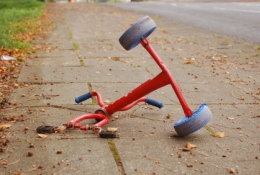14 October 2013
 Up to one in seven school children will suffer from a mental health problem and preparing teachers to identify, support and manage mental health issues in the school context is the focus of a new research project that will be showcased at an October forum of UniSA’s Healthy Kids Research and Innovation cluster.
Up to one in seven school children will suffer from a mental health problem and preparing teachers to identify, support and manage mental health issues in the school context is the focus of a new research project that will be showcased at an October forum of UniSA’s Healthy Kids Research and Innovation cluster.
The forum The Art of Trauma Transformation on October 17 at UniSA’s City East campus will bring together six speakers from both UniSA and research partners across government and the community to showcase a range of programs and research working to support children who have suffered trauma or who have mental health challenges.
For UniSA researcher and lecturer in special education and inclusion, Dr David Armstrong, the forum presents a special opportunity to explain the direction of two new research projects.
“I am researching issues that make an impact on the best outcomes for students but also intrinsically support the development of better teachers, more thoroughly equipped to meet the challenges faced by modern teachers,” Dr Armstrong says.
“Even from the earliest years in the classroom teachers will be confronted with children who are hard to manage and difficult to teach.
“The challenge for them is being able to identify how serious that problem might be and if a child has issues that are deeper than the more superficial behaviour management stand-offs that are part and parcel of teaching.
“Research shows that left untreated 50 per cent of mental health problems in primary school children continue on into later years, so working in partnership with Child and Adolescent Mental Health Services we hope to develop a framework for teachers so that they are more able to evaluate what support a child might need and at what point to refer problems on to other experts.”
Dr Armstrong says teachers in the earliest years of their career can be dealing with students with a wide range of mental health issues from anxiety and depression, to post traumatic stress, anorexia or bulimia and the onset of serious mental health conditions or mental health disorders that co-exist with other health issues such as a disability or an illness.
His second project working in collaboration with psychologists at the Modbury Hospital is to research autistic children’s understanding of happiness.
“Children with autism can be quite alienated from the world around them because they often do not recognise commonly understood social queues due their different neural development.
“Life can be frustrating and dispiriting for children with autism so we want to understand their experience of happiness - if it is the same as that of other children or if it is different and in what ways.
“It will quite significant to the support we can provide for children with autism if we can crack this and more clearly define the autistic child’s notion of happiness.”
Other highlights include presentations on the SMART and SMART=ER education programs.
Starting eight years ago, the Strategies for Managing Abuse Related Trauma (SMART) program offers education for a range of frontline staff working with children who have suffered or continue to be exposed to abuse and trauma, including teachers and early childhood personnel.
The program, developed by the South Australian Department for Education and Child Development (DECD), in collaboration with the Australian Childhood Foundation and the Indigenous Health Unit at Monash University, offers a comprehensive learning program designed to build the capacity of staff to understand the impact of abuse on children for their learning, development and mental health.
Beth Guy, Program Manager, Training and Professional Development Program, Australian Childhood Foundation and Lee Duhring, DECD Policy Advisor, Child Protection Initiatives, Student, Aboriginal and Family Services, will focus upon the basic information that is the premise of the program and reflect on the wonderful contributions and outcomes schools have developed and practiced through research projects and participation in whole school training.
Other presenters include:
- Annette Bulling from Principals Australia Institute, SA Coordinator MindMatters, discussing the impact on staff of working with children who are victims of abuse and staff wellbeing, including the StaffMatters program
- Carolina Haro, Children’s Therapeutic Worker from Relationships Australia discussing the effectiveness of narrative therapies for children who are victims of trauma.
Co-convenor of the Health Kids Research and Innovation cluster at UniSA, Dr Karma Pearce says the opportunity to share research and practical experience at the forum is vital.
Being able to come together and examine what is working in a real world context and hear also about new research initiatives in the field is a powerful tool for our ongoing research,” Dr Pearce says.
“It helps to test and validate the work we are doing, offers a chance to develop new ideas and evaluate new considerations and ensures that the cluster in on track in delivering its goals.”
The Healthy Kids Research and Innovation cluster is a multidisciplinary group of stakeholders who share a commitment to identifying and researching the factors that underpin the health and wellbeing of children, from infancy to adulthood.
Research and inquiry spans a wide range of social, educational, nutritional, physical, cultural and other areas affecting the healthy development of children and emphasis is placed on framing and addressing research questions in partnership with government, NGOs, education, play and service providers, and the wider community.
Media contact: Michèle Nardelli office: 08 8302 0966 mobile: 0418 823 673 email: Michele.nardelli@unisa.edu.au



